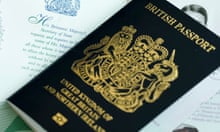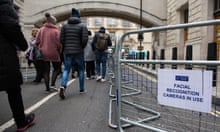An office worker who believes his image was captured by facial recognition cameras when he popped out for a sandwich in his lunch break has launched a groundbreaking legal battle against the use of the technology.
Supported by the campaign group Liberty, Ed Bridges, from Cardiff, raised money through crowdfunding to pursue the action, claiming the suspected use of the technology on him by South Wales police was an unlawful violation of privacy.
Bridges, 36, claims he was distressed by the apparent use of the technology and is also arguing during a three-day hearing at Cardiff civil justice and family centre that it breaches data protection and equality laws.
Facial recognition technology maps faces in a crowd and then compares them to a watchlist of images, which can include suspects, missing people and persons of interest to the police. The cameras scan faces in large crowds in public places such as streets, shopping centres, football crowds and music events such as the Notting Hill carnival.
Bridges, a former Liberal Democrat councillor, believes his image was captured while shopping in Cardiff, and later at a peaceful protest against the arms trade.
Dan Squires QC, representing Bridges, said: “What AFR [automated facial recognition] enables the police to do is to monitor people’s activity in public in a way they have never done before.”
He said: “The reason AFR represents such a step change is you are able to capture almost instantaneously the biometric data of thousands of people.
“It has profound consequences for privacy and data protection rights, and the legal framework which currently applies to the use of AFR by the police does not ensure those rights are sufficiently protected.”
Squires said that Bridges had a reasonable expectation that his face would not be scanned in a public space and processed without his consent while he was not suspected of wrongdoing.
The court heard that thousands of people have had their biometric data taken in the past two years by AFR technology used by South Wales police.
But Squires argued that the number of people arrested through AFR did not justify the huge number of people scanned.
The court heard that on the day Bridges was shopping in Cardiff only two arrests were made for minor offences as a result of the AFR operation.
Bridges claims he spotted AFR cameras while he was out shopping in December 2017. He said he also saw the cameras while at an arms trade demonstration in March 2018.
Speaking before the hearing began on Tuesday, Bridges said: “We don’t live in an authoritarian state. We live in a democracy. The police started using this technology against me and thousands of other people in my area without warning or consultation.
“It’s hard to see how the police could possibly justify such a disproportionate use of such an intrusive surveillance tool like this.”
Three UK forces have used facial recognition in public spaces since June 2015: the Metropolitan, Leicestershire and South Wales police.
Liberty compares scans by facial recognition cameras to taking people’s DNA or fingerprints without their knowledge or consent. It says there is no legal framework governing the use of the technology and evidence shows it discriminates against women and people from a BAME background.
Megan Goulding, a lawyer at Liberty, previously said: “Facial recognition technology snatches our biometric data without our knowledge or consent, making a mockery of our right to privacy … It belongs to a police state and has no place on our streets.”
South Wales Police argues its use of AFR does not infringe the privacy or data protection rights of Bridges as it is used in the same way as photographing a person’s activities in public, and it does not retain the data of those not on its “watch list”.
Information about AFR, on a website set up by South Wales police, says it will help the force “become smarter” and make its patch safer.
The force has said it works to “ensure that the deployment of this technology is proportionate whilst recognising the need to balance security and privacy”.
The case continues.










